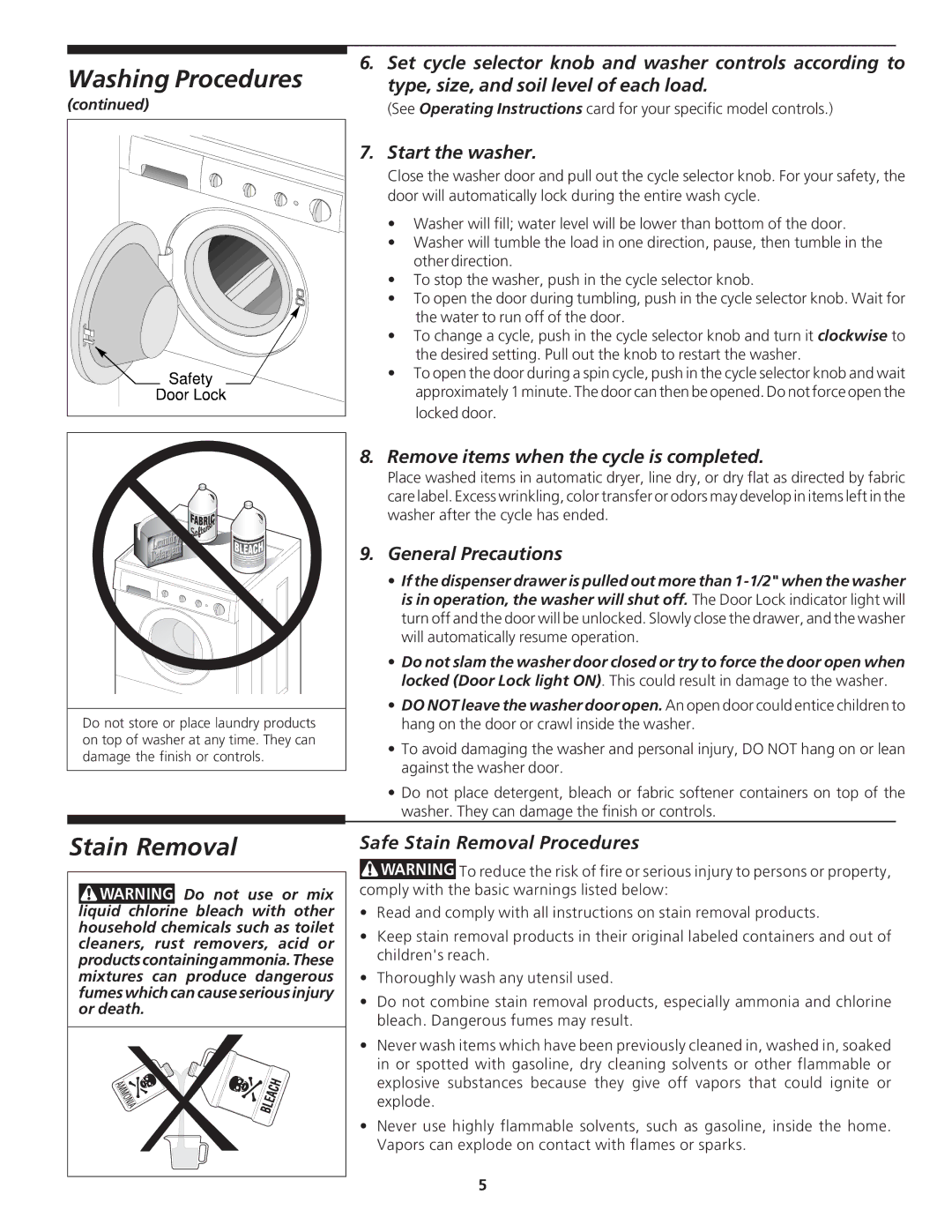
Washing Procedures
(continued) |
6.Set cycle selector knob and washer controls according to type, size, and soil level of each load.
(See Operating Instructions card for your specific model controls.)
7. Start the washer.
Close the washer door and pull out the cycle selector knob. For your safety, the door will automatically lock during the entire wash cycle.
•Washer will fill; water level will be lower than bottom of the door.
•Washer will tumble the load in one direction, pause, then tumble in the other direction.
•To stop the washer, push in the cycle selector knob.
•To open the door during tumbling, push in the cycle selector knob. Wait for the water to run off of the door.
•To change a cycle, push in the cycle selector knob and turn it clockwise to the desired setting. Pull out the knob to restart the washer.
•To open the door during a spin cycle, push in the cycle selector knob and wait approximately 1 minute. The door can then be opened. Do not force open the locked door.
Do not store or place laundry products on top of washer at any time. They can damage the finish or controls.
8. Remove items when the cycle is completed.
Place washed items in automatic dryer, line dry, or dry flat as directed by fabric care label. Excess wrinkling, color transfer or odors may develop in items left in the washer after the cycle has ended.
9.General Precautions
•If the dispenser drawer is pulled out more than
•Do not slam the washer door closed or try to force the door open when locked (Door Lock light ON). This could result in damage to the washer.
•DO NOT leave the washer door open. An open door could entice children to hang on the door or crawl inside the washer.
•To avoid damaging the washer and personal injury, DO NOT hang on or lean against the washer door.
•Do not place detergent, bleach or fabric softener containers on top of the washer. They can damage the finish or controls.
Stain Removal
![]()
![]() Do not use or mix liquid chlorine bleach with other household chemicals such as toilet cleaners, rust removers, acid or products containing ammonia. These mixtures can produce dangerous fumes which can cause serious injury or death.
Do not use or mix liquid chlorine bleach with other household chemicals such as toilet cleaners, rust removers, acid or products containing ammonia. These mixtures can produce dangerous fumes which can cause serious injury or death.
Safe Stain Removal Procedures
![]()
![]()
![]()
![]()
![]()
![]()
![]() To reduce the risk of fire or serious injury to persons or property, comply with the basic warnings listed below:
To reduce the risk of fire or serious injury to persons or property, comply with the basic warnings listed below:
•Read and comply with all instructions on stain removal products.
•Keep stain removal products in their original labeled containers and out of children's reach.
•Thoroughly wash any utensil used.
•Do not combine stain removal products, especially ammonia and chlorine bleach. Dangerous fumes may result.
•Never wash items which have been previously cleaned in, washed in, soaked in or spotted with gasoline, dry cleaning solvents or other flammable or explosive substances because they give off vapors that could ignite or explode.
•Never use highly flammable solvents, such as gasoline, inside the home. Vapors can explode on contact with flames or sparks.
5
